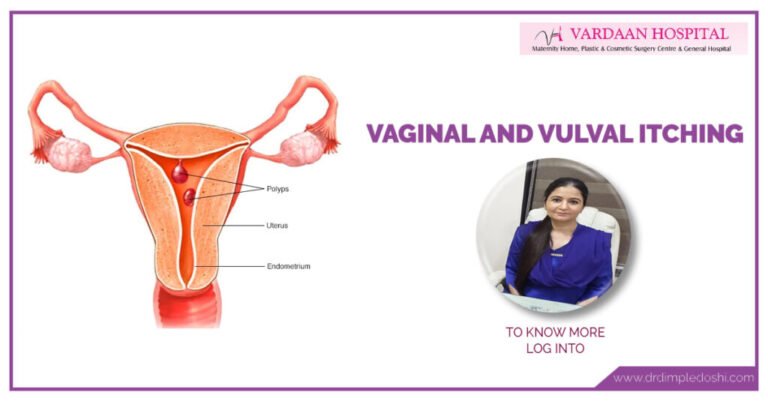
Effective Relief from Vulval and Vaginal Itching – Mumbai Expert Care
Are You Struggling with Constant Itching Down There?
- Is the itch in your private parts keeping you up at night?
- Do you feel uncomfortable during your daily routine, or embarrassed during intimate moments?
Vulval and vaginal itching can be more than just annoying—it can disrupt your life, affect your confidence, and make you constantly worry about hygiene or infections.
The good news? Relief is possible. With a personalized diagnosis and expert care by Dr. Dimple Doshi at Vardaan Hospital, Mumbai, you can stop the cycle of itching and discomfort—and prevent it from recurring.
Vaginal infections like yeast infections affect 3 in 4 women at some point. In India, this is a top concern for women visiting gynecologists. According to ISAPS Global Survey 2023, gynecology-related consultations for infections and irritation are rising, especially in urban areas like Mumbai.
What Are the Main Causes of Vaginal and Vulval Itching?
Vaginal itching can result from infections, irritants, hormonal changes, or skin conditions, each needing specific diagnosis.
- Irritants: Fragranced soaps, bubble baths, sprays, and laundry products
- Infections: Yeast infection, bacterial vaginosis, STDs
- Hormonal: Menopause-related dryness or mucosal thinning
- Skin Conditions: Eczema, psoriasis, or allergic dermatitis
- Others: Diabetes, poor hygiene, stress, or vulval cancer
When Should You See a Doctor for Vaginal Itching?
See a gynecologist if itching is severe, persistent, or associated with pain, discharge, or skin changes.
- Lasts more than a week despite home care
- Associated with burning, blisters, or ulcers
- Unusual vaginal discharge or strong odor
- Pain during sex or discomfort while urinating
- Itching disrupts sleep or daily routine
How Is Vaginal Itching Diagnosed?
Diagnosis involves symptom history, physical exam, and lab tests to find the exact cause.
- Medical history: Duration, severity, and triggers
- Physical exam: Vulva, vaginal canal inspection
- Tests: Swabs, pH level, urine or blood analysis
- STI screening: If high-risk exposure suspected
How Is Vaginal Itching Treated?
Treatment depends on the cause—ranging from antifungal creams to estrogen or antibiotics.
- Antifungal creams: For yeast infections
- Antibiotics: For bacterial vaginosis or STIs
- Estrogen creams: For menopausal atrophy
- Steroid creams: For allergic or irritant reactions
What Is the Treatment for Vaginal Discharge (Leukorrhea)?
Treatment is based on the discharge type and may include antifungals, antibiotics, or vaginal pessaries.
- Fluconazole: For candidiasis
- Azithromycin or metronidazole: For bacterial causes
- Intravaginal tablets or pessaries: Faster local relief
Are Home Remedies Effective for Vaginal Itching?
Home remedies may offer temporary relief, but medical treatment is necessary for long-term or recurring cases.
- Honey and yogurt: Natural antifungal properties
- Tea tree oil: Mild relief if diluted properly
- Apple cider vinegar: Soothing in diluted baths
- Use only when medical help is not immediately available
How Can You Prevent Vaginal and Vulval Itching?
Prevention includes hygiene, lifestyle changes, and avoiding known irritants and allergens.
- Wash with plain, unscented soap and water
- Wear breathable cotton underwear
- Dry innerwear in sunlight to kill bacteria
- Avoid tight-fitting or damp clothes
- Manage diabetes and maintain healthy weight
- Use condoms to prevent STIs
- Take probiotics if on antibiotics
What Medical Codes Apply to Vaginal and Vulval Itching?
Doctors may use ICD-10 and CPT codes to document diagnosis and treatment for insurance and clinical care.
- ICD-10: N76.0 (Acute vaginitis), N76.2 (Chronic vaginitis), N95.2 (Vulvar pruritus), B37.3 (Candidiasis)
- CPT: 99201–99215 (consultations), 87270 (vaginal smear), 87491 (Chlamydia test), 87591 (Gonorrhea test)
Is It Vaginal Itching or a Yeast Infection?
Yeast infections cause thick discharge and burning; plain itching may lack discharge or show no fungal overgrowth.
- Yeast infection: White discharge, intense itching, swelling
- Confirmed via vaginal swab test and pH check
- Allergies and bacterial vaginosis can mimic yeast symptoms
Can Stress or Hygiene Habits Cause Vaginal Itching?
Yes, poor hygiene or high stress can disrupt pH balance, leading to dryness, irritation, or infections.
- Overwashing or use of scented products can irritate skin
- Stress weakens immunity and alters vaginal flora
- Tight, synthetic clothes increase moisture and risk
Which Soaps, Products, or Habits Should You Avoid?
Avoid harsh soaps, scented pads, douches, and fabric softeners as they may trigger or worsen itching.
- Avoid: Scented soaps, bubble baths, intimate sprays
- Stay away from scented toilet paper or wipes
- Do not use douches or vaginal washes unnecessarily
- Choose mild detergent and avoid fabric softeners for underwear
(FAQs) Frequently Asked Question About Vaginal Itching
Q1. Can a vaginal yeast infection go away on its own?
Ans. Mild cases may resolve on their own, but treatment is recommended to prevent recurrence or complications.
Q2. Does coconut oil stop itching down there?
Ans. Coconut oil has antifungal and soothing properties that may help with mild itching, but it’s not a substitute for medical treatment.
Q3. How do I check myself for a yeast infection?
Ans. Look for thick white discharge, redness, swelling, and intense itching. Always consult your gynecologist for accurate diagnosis.
Q4. How do I stop itching down there?
Ans. Use unscented soap, wear cotton underwear, avoid scratching, and consult your doctor for the root cause.
Q5. How do I stop itching down?
Ans. Maintain hygiene, apply cold compresses, and avoid irritants. Medical evaluation is needed for persistent cases.
Q6. How much water to drink to flush out a yeast infection?
Ans. While hydration helps general health, yeast infections need antifungal treatment. Drink at least 8 glasses daily alongside treatment.
Q7. How to prevent vaginal yeast infections?
Ans. Maintain hygiene, wear breathable underwear, avoid douches, control diabetes, and use antibiotics cautiously.
Q8. How to trick mind to stop itching?
Ans. Distraction techniques, mindfulness, or applying cold packs can reduce the urge. Still, address the root medical cause.
Q9. Is coconut oil good for itchy skin?
Ans. Yes, it may help soothe mild irritation, especially from dryness, but fungal or bacterial infections need specific medication.
Q10. Is it okay to scratch a yeast infection?
Ans. No. Scratching can worsen irritation and lead to skin damage or secondary infection. Seek antifungal treatment.
Q11. Is vaginal itching normal?
Ans. Occasional mild itching is normal, but persistent or severe itching could signal infection, allergy, or other health issues.
Q12. What are the symptoms of too much yeast in your body?
Ans. Recurring yeast infections, fatigue, digestive issues, and cravings may indicate candida overgrowth. Consult a specialist.
Q13. What can I drink to stop itching in my private part?
Ans. Probiotic drinks, buttermilk, and water support vaginal health. Avoid sugary drinks that worsen yeast infections.
Q14. What causes itching in the private part of a woman?
Ans. Causes include yeast infections, bacterial vaginosis, STDs, irritants, menopause, and poor hygiene.
Q15. What color is a yeast infection?
Ans. Yeast infections typically have white, thick, cottage cheese-like discharge. Any unusual color warrants a check-up.
Q16. What cream can I use for itchy Virginia?
Ans. Only use doctor-recommended antifungal, steroid, or estrogen creams. Self-medicating can worsen the condition.
Q17. What cream can I use to stop itching down there?
Ans. Based on the cause, your doctor may recommend clotrimazole, miconazole, hydrocortisone, or estrogen-based creams.
Q18. What happens if a yeast infection goes untreated?
Ans. It may lead to chronic discomfort, skin damage, or spreading. In pregnant women, it may affect the baby during delivery.
Q19. What is commonly mistaken for yeast infection?
Ans. Bacterial vaginosis, dermatitis, STDs, and urinary tract infections can mimic yeast infection symptoms.
Q20. What is the best itch relief?
Ans. Doctor-recommended topical antifungals, steroids, or estrogen creams depending on the underlying cause.
Q21. What is the most powerful itch relief?
Ans. Prescription antifungal or steroid creams offer the strongest relief. Always get the right diagnosis first.
Q22. What naturally stops itching?
Ans. Cold compresses, oatmeal baths, plain yogurt (for yeast), and avoiding irritants can ease mild symptoms.
Q23. What to eat to reduce itching?
Ans. Probiotic-rich foods, low-sugar fruits, whole grains, and anti-inflammatory foods support vaginal and skin health.
Q24. Which drink is good for itching?
Ans. Probiotic drinks, aloe vera juice, and water can help reduce inflammation and maintain vaginal health.
Q25. Which ointment is best for itching in private parts female?
Ans. Depending on the diagnosis, antifungal (clotrimazole), antibacterial, or steroid creams may be prescribed.
Q26. Which tablet is best for itching?
Ans. Oral antihistamines for allergies or antifungal tablets like fluconazole for infections—only on a doctor’s advice.
Q27. Why am I suddenly so itchy down there?
Ans. Sudden itching could be due to infections, allergies, new products, stress, or hormonal shifts. See your doctor.
Q28. Why does hot water stop itching?
Ans. It can temporarily numb nerves, offering relief, but may worsen irritation. Use cool compresses instead.
Medical code for Vulvar & Vaginal Itching
ICD-10 Codes for Vulvar and Vaginal Itching
| ICD-10 Code | Description |
|---|---|
| L29.2 | Pruritus vulvae (itching of the vulva) |
| L29.3 | Pruritus of genital organs, unspecified |
| N76.0 | Acute vaginitis (commonly associated with itching) |
| N76.1 | Subacute and chronic vaginitis |
| N76.2 | Acute vulvitis |
| N76.3 | Subacute and chronic vulvitis |
| N76.9 | Unspecified vaginitis and vulvovaginitis |
CPT Codes for Vulvar and Vaginal Itching Evaluation & Treatment
| CPT Code | Description |
|---|---|
| 99213 | Office or outpatient visit for evaluation and management (low complexity) |
| 99214 | Office or outpatient visit for evaluation and management (moderate complexity) |
| 87210 | Wet mount for infectious agents (vaginal/cervical) – to check for bacterial or yeast infection |
| 87070 | Bacterial culture (general) |
| 87510 | Molecular test for vaginitis pathogens |
| 96372 | Therapeutic injection (antifungal or antibiotic if required) |
Take charge of your health today.
Book your consultation with Dr. Dimple Doshi at Vardaan Hospital, Goregaon West, Mumbai.

